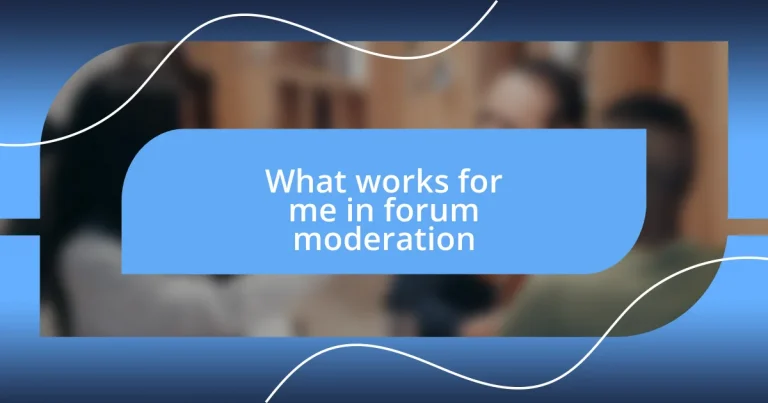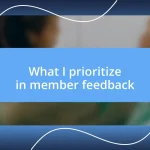Key takeaways:
- Moderators should balance authority with empathy, fostering respectful dialogue and understanding within the community.
- Proactive moderation, such as encouraging inclusivity and nurturing discussions, helps prevent conflicts and creates a supportive environment.
- Utilizing tools for efficiency, like moderation software and feedback loops, enhances community engagement and enables continuous improvement.
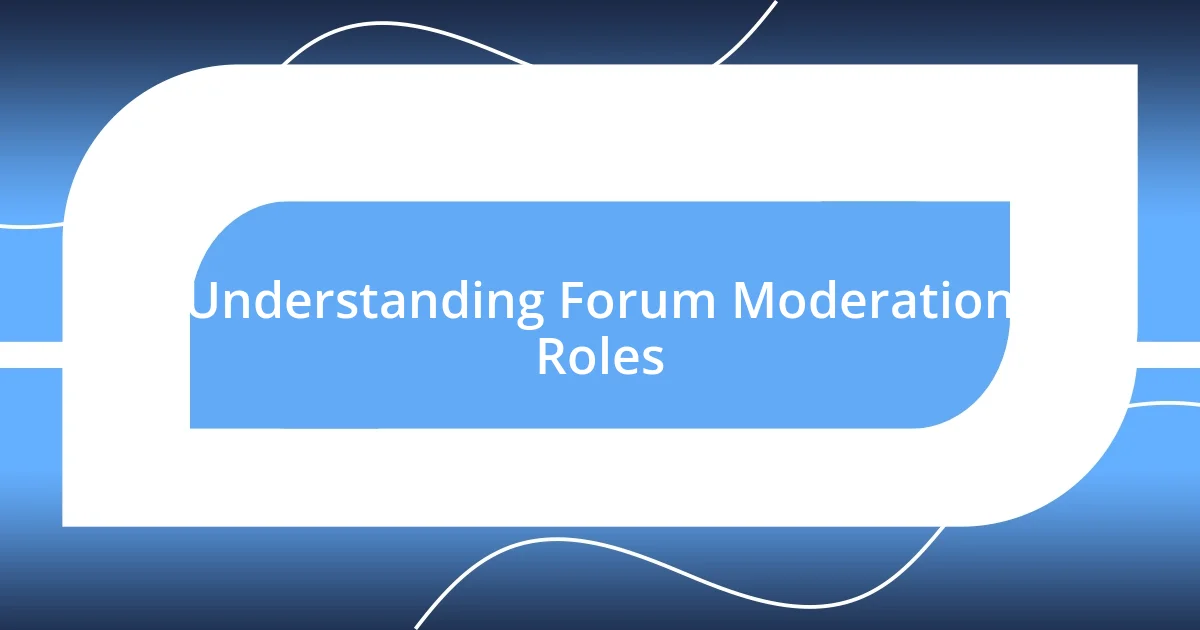
Understanding Forum Moderation Roles
In my experience, understanding the roles of a forum moderator is crucial for creating a thriving online community. Moderators often wear multiple hats; they’re not just enforcers of rules but also guides who nurture discussions. Don’t you think it’s fascinating how a good moderator can turn a heated debate into a constructive dialogue? I’ve seen it happen firsthand, and the transformation is truly remarkable.
Every time I step into the role of moderator, I’m reminded of the delicate balance we must strike. For instance, I had to intervene in a situation where a member was being overly aggressive. Instead of jumping in with rules, I shared my own struggles with frustration in discussions—I found that this personal touch diffused the tension and prompted a more respectful exchange. This experience taught me that empathy is as essential as authority in moderation.
Another key aspect of moderation I’ve learned is the importance of being proactive rather than reactive. Instead of simply waiting for problems to arise, I strive to cultivate a positive environment where issues are less likely to manifest. It’s like planting seeds of kindness and respect; they tend to grow into a community that self-regulates. Isn’t it rewarding to witness a forum where members support each other, making moderation feel like a shared responsibility rather than a chore?
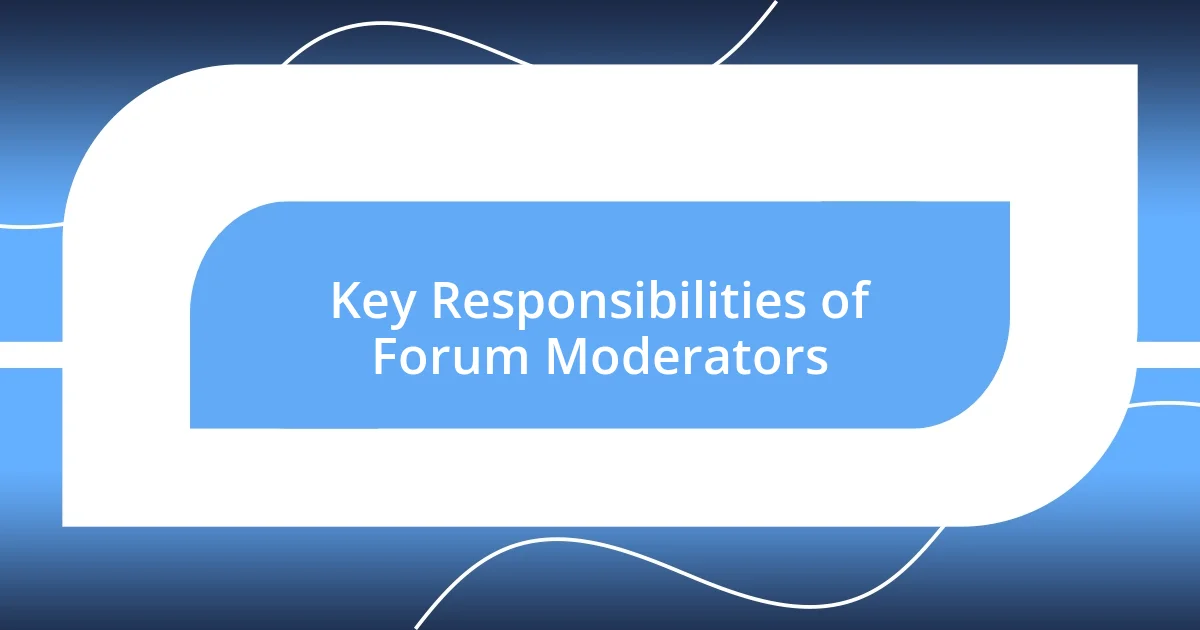
Key Responsibilities of Forum Moderators
Moderators play a pivotal role in maintaining the integrity and tone of the forum. One of my main responsibilities has always been to enforce community guidelines consistently. I remember a day when a new member posted something that veered dangerously into offensive territory. Instead of immediately slapping them with a warning, I chose to explain why their comment was inappropriate while highlighting the values we cherish as a community. That approach not only resolved the issue but also helped the member understand our culture better.
Beyond enforcing rules, I see moderator duties as nurturing a space for open dialogue. Whenever a heated debate arises, I take the initiative to steer the conversation back on track. I once found myself in the midst of a divisive topic about politics. Rather than letting the discussion spiral into chaos, I encouraged participants to share their personal experiences related to the issue at hand. This shifted the focus from confrontation to understanding, and I could feel the atmosphere transform from tense to more conciliatory.
Another significant responsibility is fostering inclusivity within the forum. I often look for ways to ensure all voices are heard, especially those who may be hesitant to speak up. I recall a time I organized a weekly thread dedicated to new members where everyone was welcomed to introduce themselves. It was heartwarming to see shy users come out of their shells and contribute, creating a richer dialogue. This was a fulfilling reminder that a moderator’s role isn’t just about managing disputes but also about creating a vibrant community where everyone feels valued.
| Responsibility | Description |
|---|---|
| Enforce Guidelines | Consistently apply community rules and explain them when necessary. |
| Nurture Discussion | Guide conversations, especially during heated debates for constructive outcomes. |
| Foster Inclusivity | Encourage all members to participate and feel valued. |
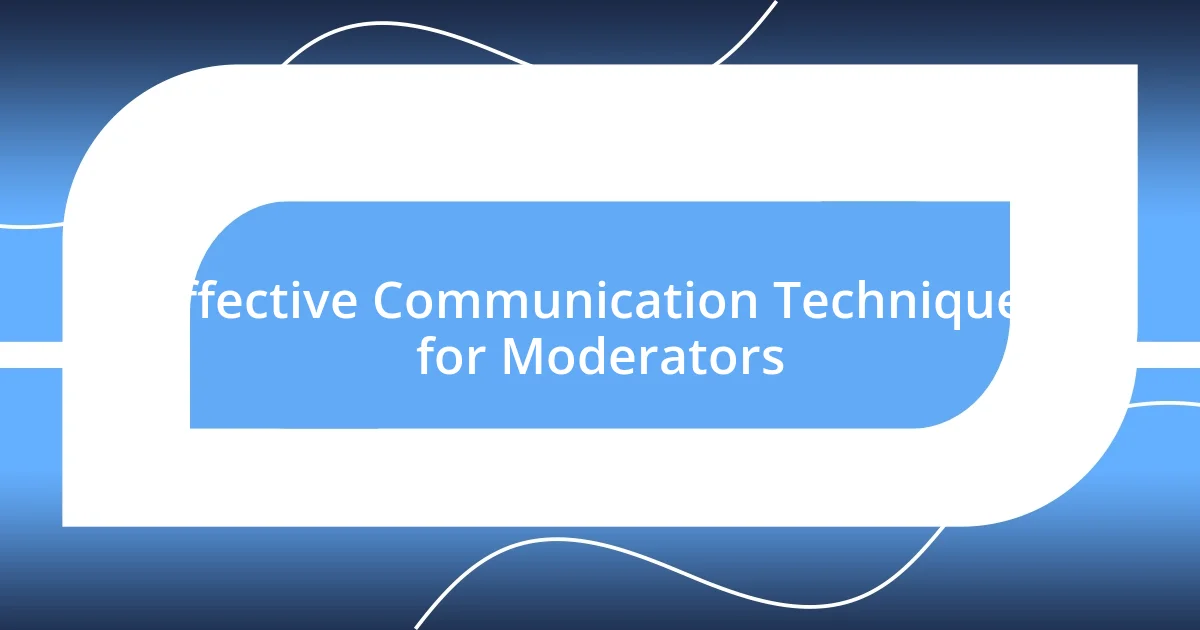
Effective Communication Techniques for Moderators
Effective communication is the backbone of successful forum moderation. I’ve found that using a friendly yet assertive tone helps create a welcoming atmosphere. There was one instance I remember vividly when a member publicly criticized another. Instead of leaving it to the private message route, I addressed it directly in the forum, acknowledging the valid points made while encouraging the original poster to express their opinions more respectfully. The response from the community was enlightening; many appreciated the open dialogue, and it turned a potential conflict into a teachable moment.
Here are some effective communication techniques I’ve relied upon:
- Active Listening: Make sure to fully understand what members are expressing before responding, which shows that you value their input.
- Clarity and Consistency: Use straightforward language when explaining guidelines and decisions; ambiguity can lead to confusion.
- Empathy: Share personal experiences that relate to the topic at hand. I often connect by recalling similar situations I’ve faced and how they made me feel.
- Encouragement: Positively reinforce constructive contributions by publicly recognizing members for their insightful posts to create more engagement.
- Timely Interventions: When a situation arises, address it quickly to prevent escalations. I often find that a swift response can maintain harmony within the community.
By weaving these techniques into my moderation style, I observe not just a smoother interaction but a more cohesive community overall. It’s a rewarding experience to cultivate an environment where communication thrives.
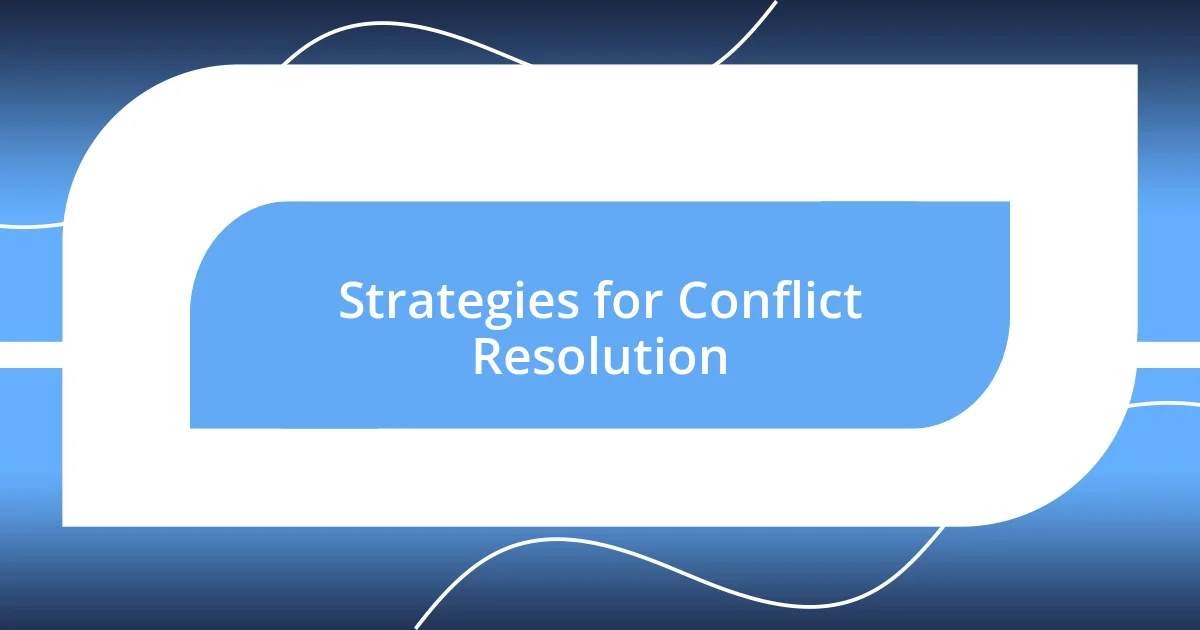
Strategies for Conflict Resolution
When it comes to resolving conflicts, I’ve learned that it often requires a patient touch. There was a time when two members became locked in a heated dispute over differing opinions on a recent game. Instead of stepping in with an immediate reprimand, I took the time to read through their arguments. I found that a simple, open-ended question—“What does this game mean to you personally?”—shifted the focus. It encouraged them to share their experiences rather than throw insults. In that moment, the tension dissolved, allowing empathy and understanding to emerge.
Another strategy I swear by is fostering a common ground. During one particularly challenging discussion where members were divided over a sensitive subject, I initiated a poll to ask everyone what they valued most about our community. The results painted a clearer picture of shared interests and goals. This approach became a catalyst for members to reflect on similarities instead of differences. By reminding everyone of our shared mission, we transformed conflict into collaboration—it was a powerful reminder of our collective purpose.
Lastly, I’ve come to appreciate the importance of follow-up conversations after a conflict has been addressed. After a notable disagreement, I reached out individually to the parties involved to gauge their feelings. I was genuinely surprised at how grateful they were for the attention. It not only solidified my role as a mediator but also built trust within the community. Isn’t that what we all desire—to feel heard and valued? Building those bridges fosters a resilient forum culture, one where members feel empowered to engage—and that’s a win for everyone involved.
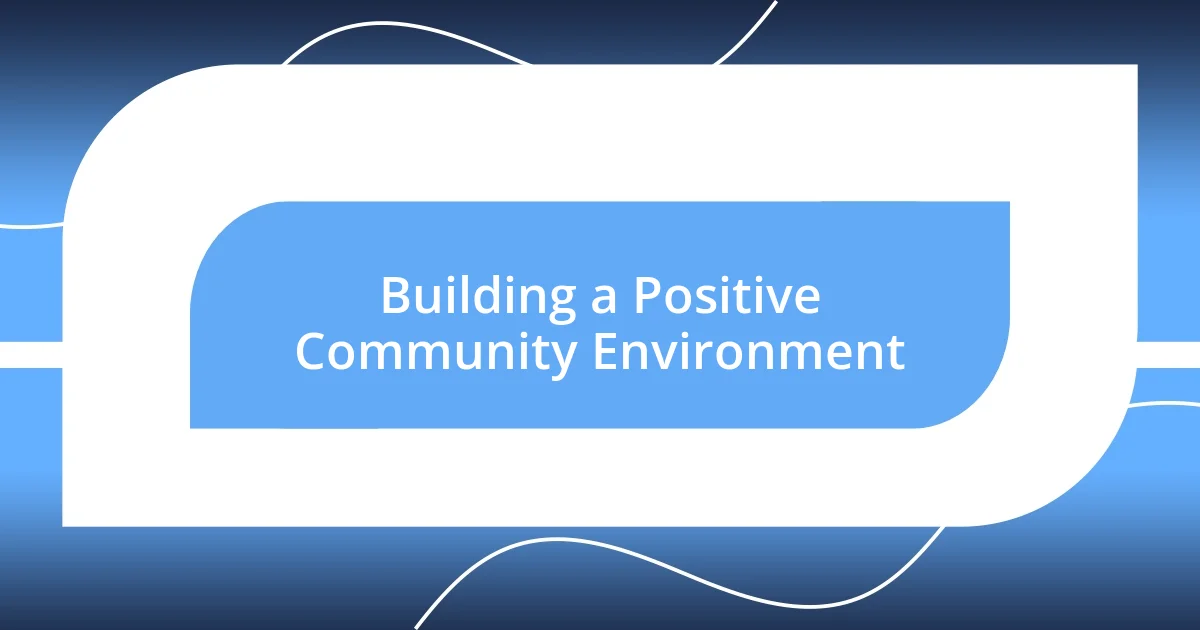
Building a Positive Community Environment
Creating a positive community environment is all about fostering connections among members. I once decided to host a “community appreciation day,” where everyone was encouraged to share something they valued about another member. The flood of compliments and shared experiences was heartwarming. It made me realize just how much people enjoy being recognized and cherished in a space where they feel they belong.
I’ve also found that setting clear expectations is crucial. When I first implemented a new set of community guidelines, I made it a point to invite feedback rather than just presenting them outright. I remember how surprised I was when several members stepped up to offer suggestions, making them feel involved in shaping the community. This two-way communication not only clarified standards but also reinforced that everyone has a voice—something I genuinely believe enhances the overall atmosphere.
Lastly, the value of shared activities cannot be overstated. When I introduced monthly themed discussions, I was skeptical at first. However, the enthusiasm that erupted surprised me! Members began to bond over their shared interests, leading to collaborations that blossomed beyond the forum. Have you ever witnessed the magic that occurs when individuals come together with a common goal? It’s not impossible—it’s a vibrant, rewarding experience that fuels a positive community vibe.
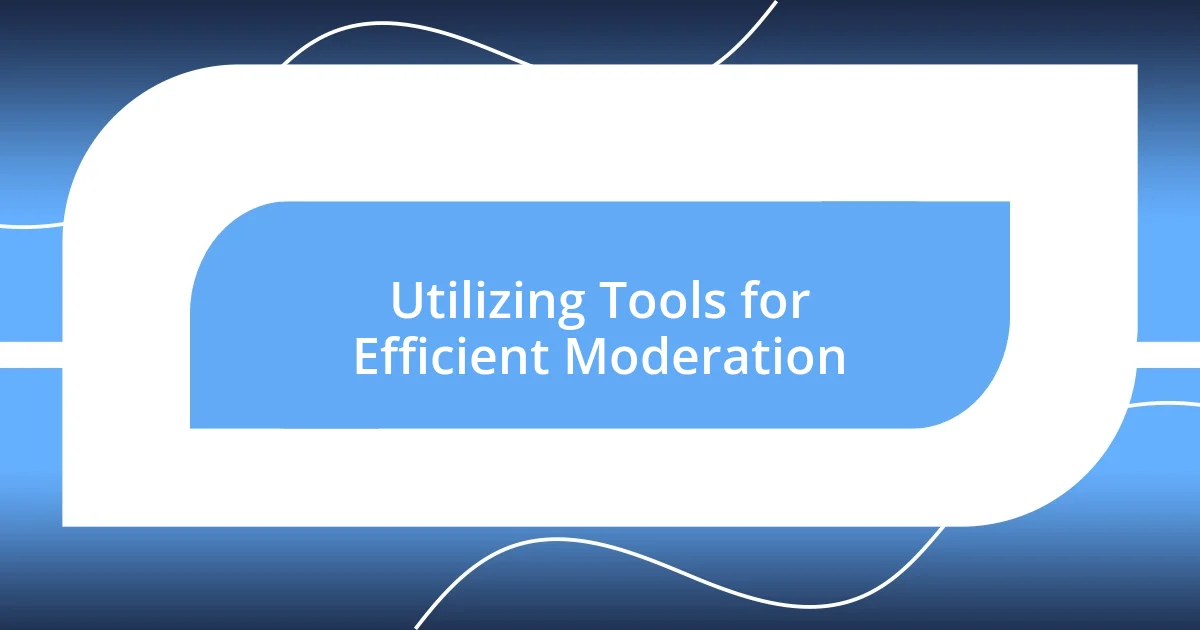
Utilizing Tools for Efficient Moderation
Utilizing technological tools can greatly enhance the efficiency of forum moderation. For instance, I discovered a smart moderation tool that automatically flags inappropriate posts based on specific keywords. Given the rate at which discussions unfold, this feature allowed me to focus on meaningful engagement rather than sifting through countless threads. Have you ever felt overwhelmed by the sheer volume of content? I certainly have, and utilizing these tools took a significant weight off my shoulders.
Moreover, implementing a structured reporting system has transformed how members communicate issues. I once had a particularly heated post that slipped through the cracks, causing a ripple effect of frustration. When I introduced the reporting feature, it was a game changer. Members felt empowered to voice concerns directly without feeling like they were snitching. I found that this not only sped up the moderation process but also fostered a sense of responsibility within the community. It’s fascinating how a simple tool can create such a notable shift in member dynamics.
Finally, I can’t emphasize enough the importance of analytics tools for monitoring community engagement. At first, I relied solely on my instincts to gauge which discussions resonated with members. However, when I started analyzing metrics—like post interactions and active member participation—a world of insight opened up. I realized that some topics generated far more interest than others. This knowledge allowed me to adjust our discussion themes strategically, ensuring that I was consistently meeting the interests of the community. Isn’t it empowering to have data that backs up your decisions? It’s a solid reassurance that we’re on the right path together.
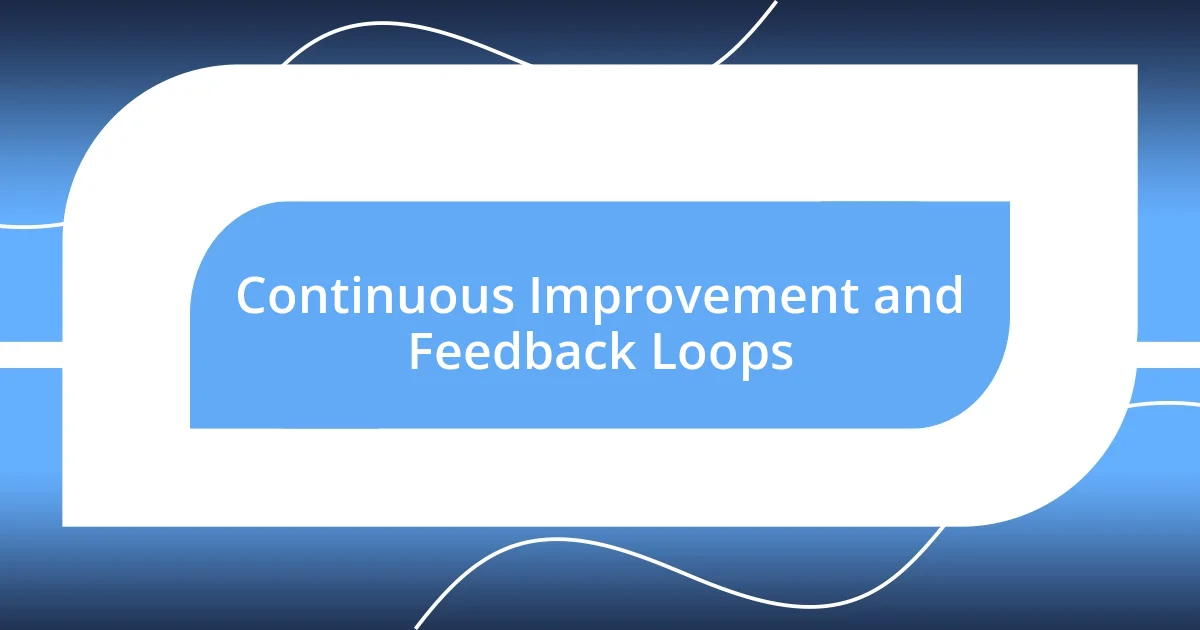
Continuous Improvement and Feedback Loops
Fostering a culture of continuous improvement in moderation doesn’t just happen; it requires intentional effort and a loop of feedback. I recall a time when I instituted an anonymous feedback form after every major community event. The insights I gathered were invaluable! Some members shared that they wanted more interactive elements in future discussions, which I had never considered. Isn’t it incredible how those quick surveys can unveil hidden preferences and steer our community in exciting new directions?
In my experience, hosting regular moderation meetings has been a game-changer for enhancing our approach. I initiated bi-weekly sessions where moderators and select community members could share their thoughts on recent challenges and successes. There was apprehension at first—would everyone feel comfortable speaking up? To my delight, the dialogues became rich and enlightening. It’s fascinating how valuable it is to listen to diverse perspectives, as it often sheds light on issues I hadn’t even realized existed. Each meeting reinforced the idea that together, we could refine our strategies for a more vibrant community.
Finally, I believe that celebrating small wins is essential to maintaining motivation in a continuous improvement mindset. After implementing some changes based on feedback, I made it a point to recognize and share the positive outcomes with the entire community. I can still picture the smiles and sense of achievement on members’ faces when they realized their input had a tangible impact. Have you taken a moment to celebrate progress in your community lately? It’s these little acknowledgments that can ignite passion and drive further improvements.












